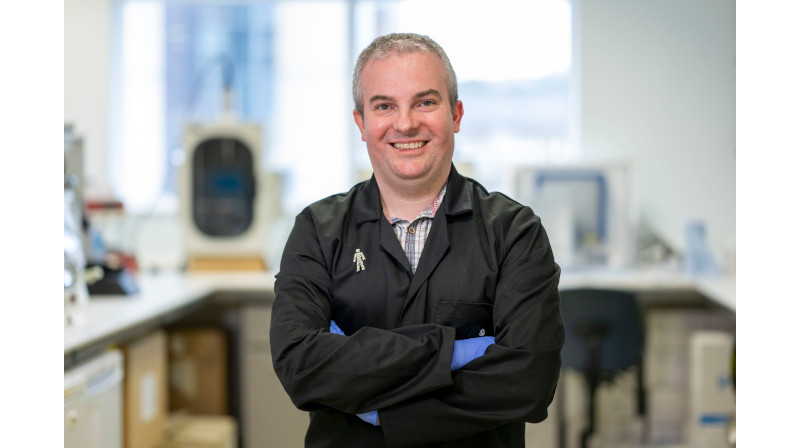Meet our featured researcher
By spying on and decoding the messages that prostate cancer cells send to each other, Dr Jason Webber and his team at Swansea University hope to revolutionise the way we track down aggressive prostate cancer.
Understanding how cells communicate
“With a test like this as part of diagnosing men for prostate cancer, we could identify which men need urgent treatment sooner than is currently possible. That means they could start treatment earlier, when they are more likely to benefit from it."
"I want to fully understand how cells communicate with one another. That’s why my research focuses on the extracellular vesicles – small packages that all cells send to one another.
In normal, healthy cells, these packages carry important messages and materials to help nearby cells work together.

But with cancer cells, these packages infiltrate the healthy cells and trick their recipients into making an environment that helps prostate cancer grow and spread."

"Although these packages normally get delivered to other cells nearby, they can also leave the area and travel around the body through the bloodstream. If they do that, then we can intercept them with a blood test.
For the last few years, we’ve been spying on these packages, trying to decode their contents, to see if we can use them to identify which men have aggressive forms of prostate cancer.
And for men, who have a less aggressive, low-grade prostate cancer, the information we uncover could provide that extra level of reassurance if they decide on active surveillance. Not just at diagnosis, but at regular intervals, to give them peace of mind that they are on the right course – or a quick response if they need to move onto a treatment.”
Why is this work so important?
“Currently, to definitively confirm or rule out prostate cancer, men have to undergo a biopsy. But a biopsy is by its very nature an invasive procedure. If we can develop a test that gives you this information on how aggressive the cancer is, it could limit the need for these men to have a biopsy at all.
It’s down to the funding that I’ve received from Prostate Cancer UK, that I’m able to make these cell discoveries and look to give men the reassurance they need when they receive a prostate cancer diagnosis.”
And the results?
We shared Dr Webber's work with our supporters alongside the story of a man who was left with unanswered questions on choosing the right path for his prostate cancer diagnosis.
This appeal is still running but has inspired supporters to donate over £100,000 so far.
As well as supporting this appeal, Dr Webber has gone on to help with the design of animation content for our webpage and is part of the scientific organising committee for From Ideas to Innovation, Prostate Cancer UK’s inaugural event for the research community in April 2024.
Feeling inspired?
If you’re interested in having your work feature in appeals for our supporters, get in touch. You can reach us at [email protected]. We’d love to hear from you and work on ways we can share your research with the supporters who make it possible.
Finally, a huge thank you to Dr Jason Webber and team for their cooperation and support throughout the process.

